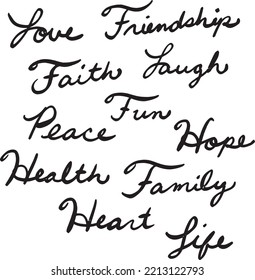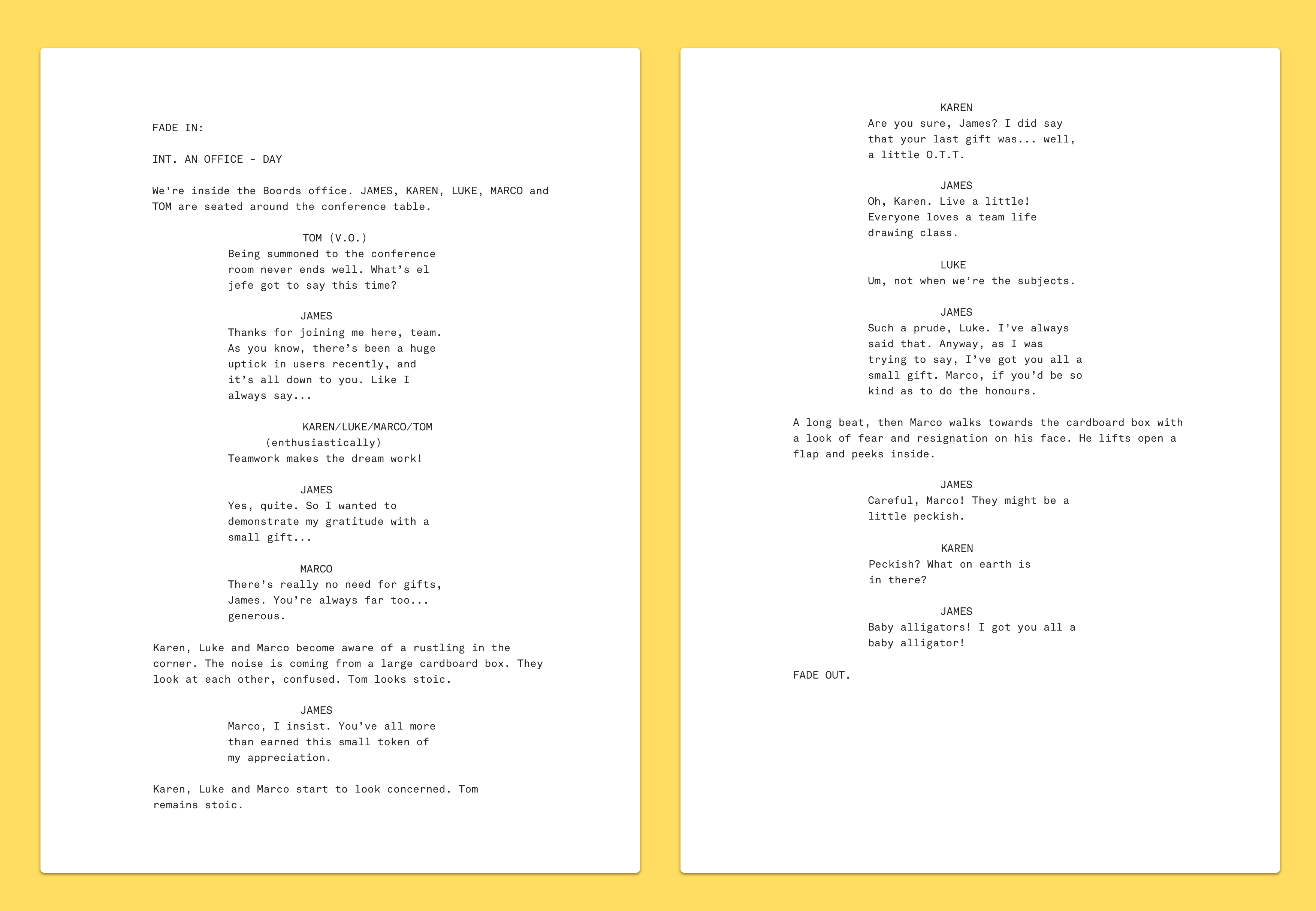Beyond The Lines: A Deep Dive Into 'Scripted Words'
Introduction
When you hear the word "scripted," what immediately comes to mind? Perhaps a movie, a play, or a television show, where every line is meticulously written down and rehearsed. We often associate "scripted" with performance, with something prepared and not spontaneous. However, the concept of "scripted words" extends far beyond the entertainment industry. It permeates our daily communication, from formal documents to the very act of writing itself. Understanding "scripted words" means delving into their definitions, exploring their vast array of synonyms, and recognizing their presence in diverse contexts. This article will unravel the multifaceted nature of "scripted words," revealing how they shape our language and interactions, and offering insights into their power and their limitations.What Exactly Are 'Scripted Words'?
At its core, "scripted" refers to something that has been planned, written, or prepared in advance. It stands in direct contrast to what is spontaneous, ad-libbed, or unwritten. The meaning of "script" itself is fundamentally "something written: text." Therefore, "scripted words" are essentially words that exist as part of a pre-determined text.The Core Definition
A "scripted" speech or broadcast, for instance, is one that has been penned before it is delivered. The speaker might give the impression that their words are flowing naturally, but in reality, they are following a pre-set blueprint. This pre-planning ensures a certain level of precision and formality. Consider memos, which are described as "highly scripted and formal documents." Their very nature demands that the content be carefully thought out and structured before being put to paper. This contrasts sharply with informal conversations or impromptu remarks, which are by definition "said or done without having been planned or written in advance." The essence of "scripted" lies in this deliberate, pre-arranged quality of the language.A Lexical Journey: Synonyms and Related Terms
The English language is rich with nuances, and "scripted" is no exception. Our thesaurus reveals a remarkable number of words and phrases that are synonymous or closely related, highlighting the diverse ways we can describe pre-written or planned communication. In fact, you can find over 200 synonyms for "scripted" to enrich your vocabulary and writing.The Obvious Connections
Many of the most direct synonyms for "scripted" revolve around the act of writing itself. Words like "written," "write," and "writtenness" immediately come to mind. These terms emphasize the tangible act of putting thoughts into a permanent, textual form. "Script," as a noun, also refers to handwriting or a particular style of writing with cursive characters, as in "She has a neat, precise script." This connection reinforces the idea of words being physically inscribed. Other close synonyms include "form" and "devise," which suggest the deliberate creation or planning of something.The Creative Canvas: From Screenplays to Manuscripts
When we think of "scripted" in a creative context, a whole new set of related terms emerges. The top related words for "script" as a noun include "screenplay," "writing," "story," and "handwriting." For "scripted" as an adjective, "screenplay" is also a prominent association. These terms transport us to the world of storytelling and performance:- Screenplay / Movie Script / Film Script: The written text of a film, including dialogue and stage directions.
- Dialogue / Lines: The spoken words exchanged between characters, all meticulously written into a script.
- Scenario: A written outline of a play, film, or other creative work, detailing the plot and characters.
- Manuscript (MS): A book, document, or piece of music written by hand or typed, typically before being printed.
The Nuance of 'Fake' and Authenticity
Interestingly, one of the top related words for "scripted" is "fake." This association might seem surprising at first, but it points to a subtle yet significant implication. While "scripted" doesn't inherently mean dishonest, it can sometimes carry a connotation of lacking genuine spontaneity or being less authentic. When a speaker "may pretend that it is spoken without preparation," the audience might perceive a disconnect between the apparent spontaneity and the underlying pre-planning. This isn't to say all scripted communication is fake, but rather that the absence of improvisation can sometimes be interpreted as less genuine, especially in contexts where naturalness is expected. It highlights the tension between precision and perceived authenticity in communication.Where Do We Encounter 'Scripted Words'?
The reach of "scripted words" extends far beyond the silver screen or the theater stage. They are integral to various forms of communication, both formal and informal.Formal Communication and Performance
The most obvious places we encounter scripted words are in formal settings where clarity, consistency, and control are paramount.- Speeches and Broadcasts: Political addresses, news reports, and formal presentations are almost always scripted to ensure the message is precise and impactful.
- Formal Documents: As mentioned, memos are prime examples. Legal documents, contracts, academic papers, and official reports are also highly scripted, adhering to specific structures and terminologies.
- Customer Service Interactions: Many customer service representatives follow scripts to ensure consistent information delivery and adherence to company policies. While they might adapt, the core framework is often scripted.
- Religious Ceremonies: Liturgies, prayers, and rituals often involve highly scripted words passed down through generations.
Beyond the Stage: Everyday Life
While less overtly "scripted" than a play, elements of pre-planned language subtly appear in our everyday interactions. Think about:- Prepared Answers: When you prepare for a job interview, you often "script" answers to common questions, even if you don't write them down word-for-word.
- Social Scripts: We follow unwritten "social scripts" in many situations, like greeting someone, ordering food, or making small talk. While not literally written, these are predictable patterns of dialogue.
- Emails and Texts: While informal, many of us draft and revise important emails or texts, effectively "scripting" our messages before sending them to ensure clarity and avoid misinterpretation.
The Power and Pitfalls of Scripted Language
Like any tool, "scripted words" come with their own set of advantages and disadvantages. Understanding these can help us appreciate their role in effective communication.Advantages: Clarity, Precision, Control
The primary benefits of using scripted words are clear:- Clarity: By planning words in advance, one can ensure that the message is unambiguous and easy to understand.
- Precision: Scripting allows for the exact choice of words, minimizing errors and ensuring that specific points are highlighted.
- Consistency: In organizational settings, scripts ensure that everyone delivers the same message, maintaining brand voice and policy adherence.
- Formality: For important or official communications, a scripted approach lends a sense of gravity and professionalism.
- Preparation: For speakers, a script provides a safety net, reducing anxiety and ensuring all key points are covered.
Disadvantages: Lack of Spontaneity, Perceived Inauthenticity
However, the very strengths of scripting can also become its weaknesses:- Lack of Spontaneity: A heavily scripted interaction can feel rigid and unnatural, lacking the dynamic flow of genuine conversation.
- Perceived Inauthenticity: As touched upon with the synonym "fake," if a speaker's delivery feels too rehearsed or robotic, it can come across as insincere, even if the content is true.
- Inflexibility: Scripts can hinder adaptability. If an unexpected question arises or the context shifts, a speaker tied to a script might struggle to respond effectively.
- Loss of Connection: An overly scripted performance can create a barrier between the speaker and the audience, as the human element of improvisation and immediate reaction is diminished.
Expanding Your Vocabulary: Finding 'Scripted' Alternatives
For writers and communicators, having a broad vocabulary is invaluable. Knowing that "scripted" has over 200 synonyms means you have a vast toolkit at your disposal to express nuances. Whether you're looking for words related to the act of writing, the creation of a narrative, or the planned nature of communication, a thesaurus is your best friend. Tools like Scrabble Word Finder, Wordle solver, and Words With Friends cheat dictionaries can also help you discover words containing "script" or related terms, aiding in both word games and creative writing. Exploring these alternatives can significantly improve your writing and expand your expressive capabilities.Conclusion
"Scripted words" are far more pervasive and complex than their common association with movies and plays might suggest. From the meticulous planning of a formal memo to the grand narratives of a screenplay, these words are characterized by their pre-written, pre-planned nature. We've explored their core definition, journeyed through a rich landscape of synonyms ranging from "written" and "screenplay" to the intriguing "fake," and examined their presence in both formal and everyday contexts. While offering undeniable advantages in terms of clarity, precision, and control, scripted language also presents challenges related to spontaneity and perceived authenticity. Ultimately, understanding "scripted words" enriches our appreciation for the deliberate craft of language and empowers us to use words more effectively, whether we're writing a formal document, crafting a story, or simply engaging in thoughtful communication.
Handwritten Script Words Motivational Spiritual Mindful Stock Vector

How to write a script | Boords

Carefree– DLS Design